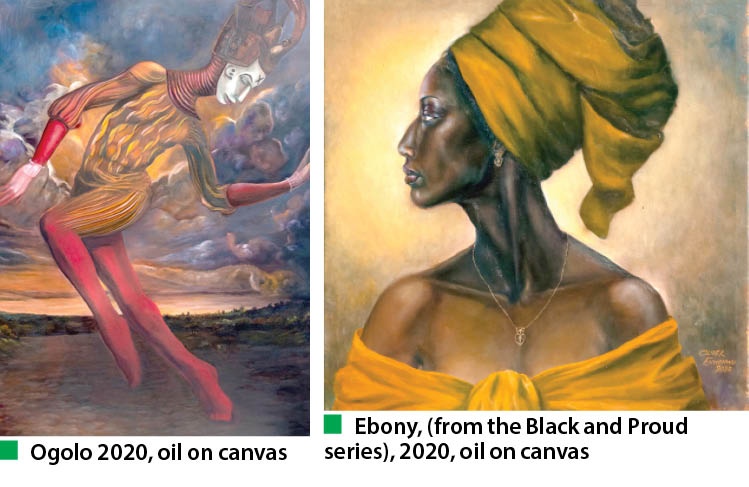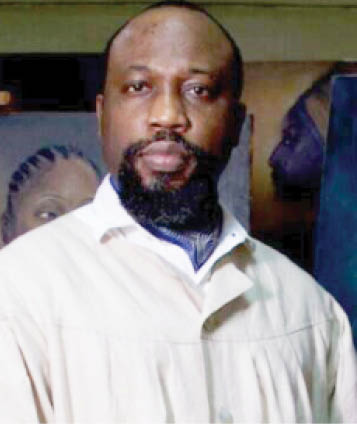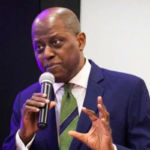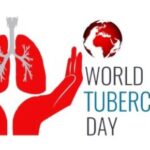The pan-African’s Tess Parker caught up with acclaimed Nigerian artist, curator, commentator and entrepreneur Oliver Enwonwu. Despite his celebrated artistic lineage – Oliver’s father Ben Enwonwu is lauded as Africa’s pioneer modernist – Oliver has forged his own creative path. As a leading cultural figure and pan-African commentator, he celebrates the cultural, political and socio-economic achievements of Africans across the diaspora. He is passionate about raising domestic and global awareness of the rich spectrum of Black culture. As the Founder and Director of The Ben Enwonwu Foundation and immediate past President of the Society of Nigerian Artists (SNA) he is a champion and guardian of African visual arts excellence. As Director of the Omenka Gallery and Magazine he is a passionate advocate of African talent and Black voices from across arts, business and lifestyle spheres.
What was it like growing up in the Enwonwu household in a post-civil war Nigeria?
Growing up, I watched my father paint and sculpt. I strongly recall his work ethic, discipline and moments of deep quietude, which were required to inspire his most important work. Even as children, we were expected to keep busy or, as he would say, “do something useful” like gardening or reading. He was an eloquent man with a great sense of style, and this made a big impression on me growing up. Interestingly, it was my father who would spot my artistic gifts in an early, chance encounter. One day, suspecting I was tracing, he ordered me to redo a drawing in his presence. Later, he said to my mother “Oliver draws with mathematical precision.” This moment sparked a life-long love for art.
What were your passions as a child? How far were you drawn to creative pursuits?
I was always a scholarly child, even winning prizes for academic excellence at school. However, my artistic gifts were also clear – I made friends and admirers by drawing their portraits. At King’s College Lagos, where I did my secondary schooling, my talent was noticed too. I excelled in art classes which caught my father’s attention. Art would continue to influence me as I grew. I spent time in my father’s studio as an informal apprentice learning the rudiments of the subject. Soon, I was assisting him with painting straight lines which formed the background for significant portraits of figureheads such as Sir Adetokunboh Ademola, the first indigenous Chief Justice of Nigeria.

Coming from a rich artistic lineage, how did you set about carving your own, unique path?
I come from a long line of Nigerian artists. My grandfather was a traditional sculptor and my late father Ben, is celebrated as Africa’s ground-breaking modernist. Whilst both men have surely inspired me as an artist, I was always keen to develop a distinct style of my own. In my work, I elevate Black culture with a view to challenging racism and injustice. I live to shine a light on the cultural, political and socio-economic achievements of Africans. I achieve this through my examination of spirituality, Black identity, contemporary politics, Pan Africanism and the global Africa empowerment movement.
Like my father, I’ve adopted the female, the Onitsha masquerade pantheon and dancers within my artistic body of work. However, there are points of difference between my father’s and my style. To capture movement, my figures are drawn in a calm, realistic way, which is different to my father’s semi-abstract approach. Also, I show physical rhythm without exaggerating limbs and torsos. In contrast to my father, my painting technique avoids whimsical lines, fractals and other repetitive forms.
Over the years I have developed distinctive brushwork incorporating texture and thick impasto highlights. I favour translucent layers of oils painted over each other to bring luminosity to my work. This is different to my father’s use of oil paints applied thinly like gouaches or watercolours.
In addition to painting, I also write, publish, and run a gallery and curate. My broad professional portfolio is a departure from my father, who was mainly focused on his visual arts practice and advocacy. I am truly passionate about promoting and nurturing Nigerian and African creative talent in as many ways as I can.
- Rare ancient book to be auctioned for over $2.6m
- Obaseki leads Nigerian delegation to Italian art exhibition
Sadly, you lost your father Ben in early adulthood. How did his death impact on you as a young man starting out in his life and career?
Following an initial period of deep mourning, I was inspired to preserve my father’s legacy and build on his contribution to the arts and humanity. Subsequently, in 2003, I established The Ben Enwonwu Foundation as a platform to further these goals. My involvement in the Foundation not only inspires me but drives me to pursue excellence in all that I do. Following his passing, I didn’t just strive to become a better painter. I also became proactive in finding new ways to promote my creative peers and emerging Nigerian contemporary artists. Through my role as Director of the Omenka Gallery and Editor-in-Chief of Omenka Magazine, I showcase Nigerian and African arts and culture amongst other things.
At first, your higher education took you on a scientific path. What drew you back to the visual arts?
I studied biochemistry as first degree and later geophysics, but my passion for art has never left me. In fact, I was awarded a Master’s in visual arts, and I am currently working towards a PhD in African art history. As mentioned above, as the son of a celebrated artist I couldn’t help but develop an appreciation for art. I graduated from secondary school with distinctions in the sciences as well as in the fine art.
My love for art grew during my time at the University of Lagos. In fact, during that period, I began to show my work in some notable galleries including my first group show in 1997. In the decades that have followed I have been lucky to have the opportunity to engage in group and solo exhibitions at home and abroad. My work can be found in Nigeria at the National Gallery of Art, the Bank of Industry and the Delta State Government.
Womanhood and the female form are central to your paintings. Which woman has had the greatest influence on your life to date?
It must be my mother for her huge sacrifice and selflessness in relation to my siblings and me. Throughout, she has been my greatest cheerleader and support system.
You have won international acclaim for your work as an artist, gallerist, curator and cultural commentator. Which aspect of your work fires you up the most?
I consider myself first and foremost as an artist. I’m happiest when I’m painting as it is a process of deep reflection for me. My solo exhibition ‘Politics of Representation’, presented by leading gallery SMO Contemporary opened recently in Lagos to great success. The exhibition centres on the elevation of Black culture and includes works that portray multiple viewpoints. It has a strong emphasis on the African female perspective as women emerge from postcolonialism to redefine their paths and counter cultural stereotypes.
Traditionally, I believe, that Western media has misrepresented or underrepresented African people and cultures. Therefore, it is critical that we build understanding of the roles of identity and culture in shaping citizenship and political representation in Nigeria and Africa.
Through your roles in the Omenka Gallery and Magazine you promote the ideas and accomplishments of established and emerging African talent. Who are the upcoming African artists that most excite you today?
Africa has a plethora of artistic talent so this is a difficult choice to make. However, amongst the upcoming artists, I will give my nod to Ken Nwadiogbu and Arinze Stanley, both from Nigeria; the Ivorian Carine Mansan; and Krubel Abebe and Tizta Berhanu, both of whom are from Ethiopia.
In your opinion, how important is art and culture as a tool for political and socio-economic change in a 21st Century Africa?
I believe art is crucial to drive political and socio-economic change and development in 21st -century Africa. Art it is a powerful vehicle for communication as well as enlightenment and can influence the course of history.
Across the ages, art, politics and social issues have inspired artists. Through art, many countries have exerted soft power, rebranded or improved their image and repositioned themselves. Such examples abound in Pablo Picasso of Spain and J.M.W. Turner of England.
Through international residencies, museum visits and collaborative projects, art and artists can build cross-cultural links. Businesses such as galleries, auction houses, professional shippers and framers can contribute to a nation’s economy and tourist appeal. Art is also an attractive asset which wealth managers can integrate into their offerings.
In these volatile, global times, where do you think Africa can be most influential in helping to shape a better world?
It is important for Africans to tell their own story and in so doing, change the world for the better. Africa has a vibrant young population who are influenced by international media and brands. However, it is important that we educate our young people about their African roots and culture, empowering them to succeed and strive for a more equitable world.
By celebrating fellow Africans, their achievements and contributions to humanity, we challenge negative stereotypes of corruption, poverty and terrorism. Based on the global challenges of systemic racism and police brutality, we must seize opportunities to celebrate Black excellence and culture.
As we carve out our post-colonial identities, emerging African nations must work together to debunk racial stereotypes and limitations; we deserve to be judged by our merits rather than the colour of our skin or the texture of our hair.
In your busy life how do you make time to nurture your well-being, knowledge and spiritual self?
I love taking long walks, reading, listening to music and learning about different cultures. I practice karate, where I’m a first-dan.
What would your advice be to a young African looking to make their way in this ever-changing world?
Information is power, so seek knowledge whenever and wherever you can. Be a voracious reader; consume everything from inspirational stories to global affairs and literature. Expand your mind and thinking. Make time to create things of timeless beauty.
Culled from www.pan-african.net

 Join Daily Trust WhatsApp Community For Quick Access To News and Happenings Around You.
Join Daily Trust WhatsApp Community For Quick Access To News and Happenings Around You.


